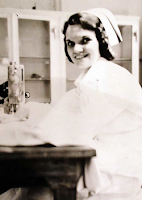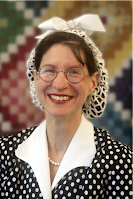 |
| Courtesy: FindAGrave |
Unfortunately, as history has shown, several errors hastened the fall of the Philippines to the Japanese, including ill-trained men, poor equipment, and the underestimation of the power of the Japanese forces. Another issue was the lack of manpower. Military scholars feel MacArthur needed at least 150,000 troops to defend the country, yet he commanded fewer than 35,000 Americans. President Franklin Roosevelt was concerned those conditions would precipitate the fall of Corregidor and MacArthur being taken prisoner, so he ordered the general to go to Australia.
The Japanese swept into Manila like a horde of locusts, and the medical staff found themselves
 |
| Courtesy: WomenofWWII |
According to a later interview with Margaret, conditions were initially tolerable, but the constant influx of prisoners eventually overcrowded the camp. Another camp was opened in Los Baños on Luzon, and Margaret and other Navy nurses volunteered to go and set up the hospital. Prisoners were expected to grow their own food, but overcrowding became a problem again, and eventually, they were reduced to eating leaves and slugs as supplies ran out.
Three years would pass during which the nurses suffered intense emotional strain, wondering daily if they would live to see the next day. Margaret indicated that the guards never beat the women but they would “walk into their quarters at any hour of the day or night…causing distress because we never knew what they had in mind.” She went on to say, “We never stayed alone in a room and kept our clothes on at all times.” Mentally and physically exhausted, by 1944 the entire camp suffered from malnutrition, yet Margaret neglected her own health to nurse her fellow prisoners who were diseased and near starvation. She would soon be as ill as her patients with symptoms of beriberi, a disease caused by a lack of vitamin B.
 |
| Courtesy: history.navy.mil |
In fifteen minutes, the mission was over, and the inmates were headed to Laguna Bay in US-held territory. A mere 68 pounds, Margaret was told by doctors she would probably only live another five years. But this fighter survived, going on to have a long career in nursing and teaching at the University of California, Berkeley after retiring from the navy with the honorary rank of Lieutenant Commander. Sadly, she didn’t hear about her fiancé for nearly four years. He’d also been a POW. After his release, for some reason, she “thought it only fair to break off the engagement.” She never married and died in 1992 at the age of 81.
My initial major in college was pre-med, but Organic Chemistry did me in, so I’d never have cut it as a nurse. Are you good at the sciences?
PLEASE VISIT THE BLOG TO COMMENT ON THIS POST.
The Mechanic & The MD
All’s fair in love and war. Or so they say.
High school and college were a nightmare for Doris Strealer and being an adult isn’t much better. Men won’t date a woman of her height, and they don’t understand her desire to repair car engines rather than work as a nurse or a teacher. When her father’s garage closes, and no one will hire a female mechanic, she joins the Red Cross Motor Corps, finally feeling at home. Until she comes face to face with her past in the form of Ronald McCann, the most popular boy in school.
On the brink of a successful career as a surgeon, Ron’s plans crumble when he’s drafted and assigned to an evacuation hospital in England, the last place he expects to run into a former schoolmate. The gangly tomboy who was four years behind him in high school has transformed into a statuesque beauty, but a broken engagement in college leaves him with no desire to risk his heart ever again.
Will the hazards of war make or break the romance between this unlikely couple?
Purchase Link: https://books2read.com/u/3RNpjY
Linda Shenton Matchett writes about ordinary people who did extraordinary things in days gone by. A volunteer docent and archivist for the Wright Museum of WWII, Linda is a former trustee for her local public library. She is a native of Baltimore, Maryland and was born a stone’s throw from Fort McHenry (of Star Spangled Banner fame). Linda has lived in historic places all her life, and is now located in central New Hampshire where her favorite activities include exploring historic sites and immersing herself in the imaginary worlds created by other authors. Learn more about Linda and her books at http://www.LindaShentonMatchett.com
Linda Shenton Matchett writes about ordinary people who did extraordinary things in days gone by. A volunteer docent and archivist for the Wright Museum of WWII, Linda is a former trustee for her local public library. She is a native of Baltimore, Maryland and was born a stone’s throw from Fort McHenry (of Star Spangled Banner fame). Linda has lived in historic places all her life, and is now located in central New Hampshire where her favorite activities include exploring historic sites and immersing herself in the imaginary worlds created by other authors. Learn more about Linda and her books at http://www.LindaShentonMatchett.com




Thank you for posting today. I was happy to read Margaret's story. We've heard of so many strong, admirable women in these posts lately!! I did not do well in Chemistry, nor the algebras. I just don't have that kind of brain, I guess.
ReplyDeleteMy guess she broke up with her fiance' because the doctor gave her five years to live. I'm sure had she known she'd live to be 81 she might have married. She probably felt her fiance' deserved a long happy marriage.
ReplyDelete